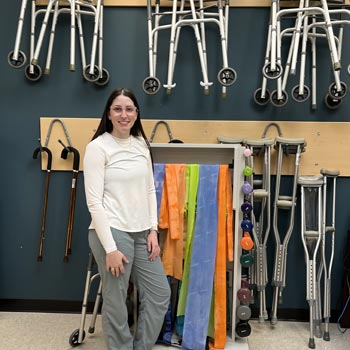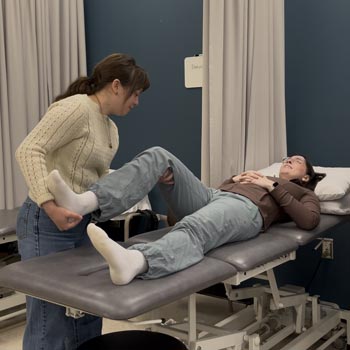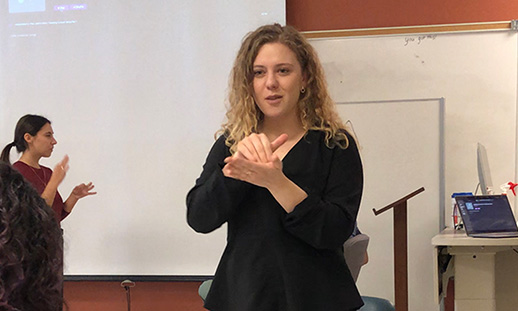A day in the life: Jessie
Get to know Jessie, Occupational Therapy / Physiotherapy Assistant student
Name: Jessie
Program: Occupational Therapy/Physiotherapy Assistant (OT/PT)
Campus: NSCC Amherst Learning Centre
Class: 2025

Why did you choose the Occupational Therapy/Physiotherapy program?
“I’m really passionate about learning about the body and movement. I was close to finishing my Kinesiology degree at university, but I needed something more hands on. After taking a few years off, I knew I wanted to follow my passion and NSCC’s Occupational Therapy/Physiotherapy Assistant program was exactly what I was looking for. The program allows me to study close to home and at a much more affordable cost.”
What's your favourite part of studying at NSCC?
“My favourite part about NSCC is the people I’ve met. We have small class sizes and we have so much in common with one another. The ladies at the front desk take the time to get to know you and that’s the theme across campus. It’s close-knit, a sense of community I didn’t feel in university.”
What surprised you most about your program at NSCC?
“I think there’s a misconception that college is “easier” than university and that’s not the case – at least not in my program! It takes a lot of work. What surprised me was that our learning goes beyond just our marks. Marks are important, but our success is also measured through who you are as a person, how you interact with your patients and how you make people feel. That’s really cool.”
What does a typical day look like in your program?
“Our program is 2 years long, so a typical day can vary depending on if we’re in the classroom or at a placement. Last semester, we started around 8:30 am in the classroom and had 3 classes a day. We spent time in a big lab room, balancing lectures evenly with hands-on practice. Classes ended around 3 pm. Over the 2 years, we take part in 4 community placements that last 5 weeks each so there’s lots of opportunity to gain new skills.”
What types of projects and assignments do you do in this program?
“Our assignments and exams range from written to practical lab tests, and lots of group work. It’s important for us to know how treatments feel, so we practise everything on one another. Our practical lab exams mimic real-world settings so my classmate will act like a patient at an appointment while I simulate the treatment.”

What’s your plan after you graduate?
“Next steps, I would really like to work in a sports setting after I graduate, working with athletes. But, I’m open to anything – working privately or within a hospital. I like this field because I can work anywhere. I can stay close to home and I can explore different industries of care with my skills.”
Is it hard to get into the Occupational Therapy/Physiotherapy Assistant program at NSCC?
“The Occupational Therapy/Physiotherapy Assistant program is only offered at Cumberland Campus (Amherst Learning Centre) and Lunenburg Campus so that can increase the competition of getting in. There are also different prerequisites than other NSCC programs, so you need to have your academic math, English, biology and either chemistry or physics. If you need to upgrade or pick up missing credits, NSCC offers the Adult Learning Program – Academic Upgrading.”
What is the hardest class in the Occupational Therapy/Physiotherapy Assistant program?
“If you ask anyone in our program, we’ll all agree that anatomy is the most challenging class. The things we learn about are fascinating but there’s a lot of memorization involved. Once you know it, things get easier. Our instructors are super helpful.”
What is the difference between a physiotherapist assistant and an occupational therapist assistant?
“One of my instructors, Sean, gave us a really great analogy to explain the difference between physiotherapist (PT) assistants and occupational therapist (OT) assistants: ‘PT assistants help you pick up the fork and OT assistants help you put the food in the mouth.’ Essentially, PT focuses on improving mobility and physical function, while OT focuses on helping people perform daily activities. Both are important.”
How long does it take to become an occupational therapist / physical therapist assistant in Nova Scotia?
“The Occupational Therapy/Physiotherapy Assistant program takes 2 years to complete in Nova Scotia, and NSCC has a new intake of students every 2 years between Cumberland and Lunenburg Campuses.”
Related Stories
 Video: A day in the life: Molly
Video: A day in the life: Molly
Molly shares a day in her life as a Natural Resources Environmental Technology student at NSCC Strait Area Campus.
 A day in the life: Cornella
A day in the life: Cornella
Cornella shares a day in the life as an American Sign Language / English Interpretation student at Ivany Campus.

